Contents
Spirea is well known to many flower growers, landscape designers and ordinary lovers of decorative flowers. Caring for it is simple, and most of the growing operations, which include pruning spirea in the fall, can be performed even by a novice gardener. This will require a very small amount of time and the most simple tools.
Autumn pruning spirea
Pruning is a necessary part of the complex of measures for the care of this shrub. It helps to maintain abundant flowering, and also constantly rejuvenates the bush. The method of pruning depends on the age of the bush, the type of plant, the time of its flowering.
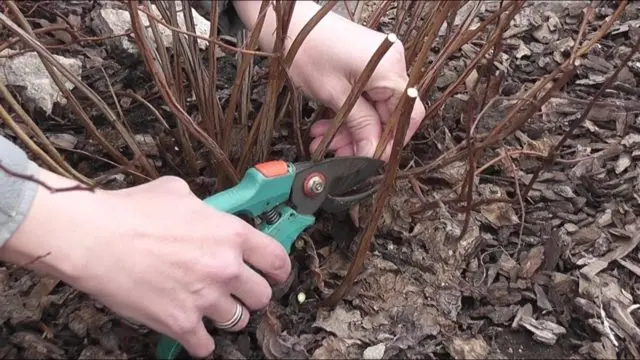
Some flower growers consider this operation unnecessary. However, without it, the bush will quickly turn into shaggy and sloppy, the shoots will stretch and thin, and the flowers will be crushed. Inside the shrub, old dried branches will accumulate, which impede air exchange, which will ultimately lead to stagnation of air inside the bush and an increase in humidity. All these factors can cause fungal diseases.
When to prune spirea – in spring or autumn
Throughout the season, it is necessary to carry out sanitary cleaning of the bush, removing broken and dried shoots. Full pruning is best done in the fall. The only exceptions are the northernmost areas of cultivation of this shrub. In them, due to the peculiarities of the climate, after the autumn shearing, the spirea may simply not have time to recover before the onset of cold weather. Therefore, in such areas it is cut in the spring.
Do I need to prune spirea for the winter
No additional pruning is required as a winterization measure. Most species of this plant are winter-hardy and easily tolerate even the most severe frosts. Before winter, it is enough to tie all the shoots into one bundle, bend them to the ground, and then cover them with a layer of mulch and snow. Varieties that do not differ in sufficient frost resistance are bent to the ground, fixed, and why they are covered with a thick layer of fallen leaves, straw or sawdust.
Types and timing of pruning spirea in the fall
For the first few years after planting, the bush is not pruned, as this can worsen the condition of its root system. Starting from 3-4 years of age, the following types of pruning can be carried out:
- Stimulating. This pruning consists in cutting off all lignified shoots at a height of about 30 cm. This measure stimulates the growth of new side shoots. The procedure is carried out in mid-autumn, before the temperature begins to drop below 0 ° C.
- Anti-aging. This is a type of deep pruning that allows you to actually grow a new bush. Rejuvenating pruning is carried out in September-October, completely cutting off all shoots at soil level. This procedure is recommended for old or pest-damaged bushes. In the spring, the spirea will grow back, giving powerful shoots from the buds located near the root neck.
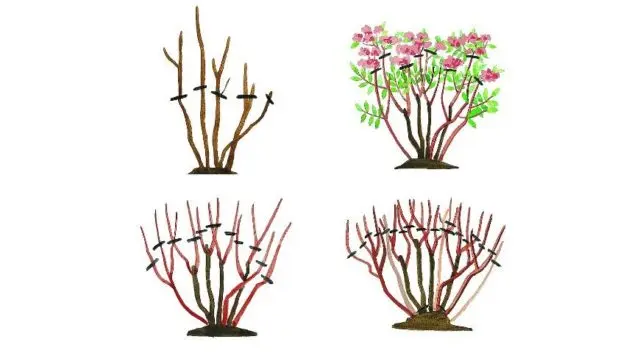
How to prune spirea in autumn
In autumn, the shoots are cut to the level at which the buds of the lignified part are located. At the same time, the formation of a bush is carried out. It is also necessary to remove some shoots from the inside to maintain normal air circulation and prevent mold from forming.
Pruning spirea in summer-blooming autumn
You can start pruning varieties of the summer flowering period, starting from 4 years of the life of the bush. In summer, the shoots can be shortened by one-third to stimulate the formation of side shoots and increase flowering. At the beginning of autumn, sanitary cleaning should be carried out, and branches that are growing incorrectly and lagging behind in development should be removed. Once every 7-8 years, it is necessary to thin out the bush intensively, leaving a few of the most powerful shoots, and completely remove all the rest.
Pruning early flowering spirea in autumn
Early varieties bloom on last year’s shoots. In autumn, about one-fifth of each bush needs to be removed, cutting them off at ground level. This encourages vigorous spring growth.
Spirea pruning scheme in autumn
A spirea bush is formed over several years. In the second year of life, you can start trimming it. It is produced according to the following scheme:
- Sick, damaged and dry shoots are completely cut out. If the branch is broken, then it is cut to 1 living kidney.
- In young shoots, the tips that have not had time to lignify are cut off.
- For bushes older than 5 years, you can start rejuvenating pruning, removing several adult shoots in order to replace them with young ones.
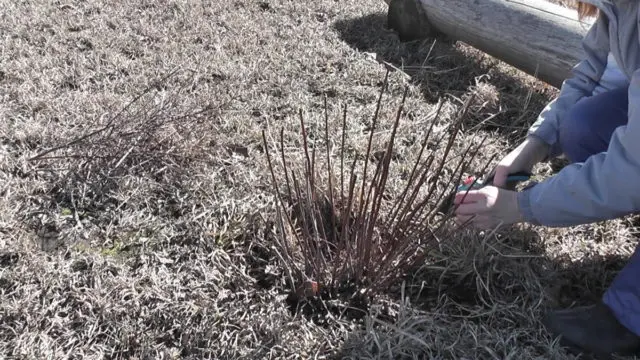
If after rejuvenating pruning there is no increased formation of new strong shoots, you should think about planting a new plant.
Pruning spirea in the fall for beginners:
How to plant a spirea in the fall
This ornamental shrub looks great in both individual and group plantings. For example, it is often used as a hedge. Before planting, you need to choose a suitable place, as well as stock up on a sufficient amount of planting material.
Site preparation
Planted spirea will do well in an open, well-lit area with loose soil. It should be borne in mind that partial shade has a good effect on this plant, it feels better in such conditions and gives brighter flowers, but their number will be less than when grown in open areas.
To loosen the soil, sand or peat is often added to it. These plants do not tolerate excess moisture, so wetlands are not suitable for planting them. Coniferous trees coexist best as neighbors with spirea.
Preparation of planting material
As a rule, seedlings of this shrub are sold in nurseries or specialized stores. Their root system must be closed, that is, the seedling must have a clod of earth on the roots. It is preferable that it is young and does not have leaves, since their presence negatively affects the survival of the plant. If the root system of the seedling is open, it must be inspected. The roots should be moist, flexible, without blackness. It is welcome if they are covered with a mixture of manure and clay. The bark of seedlings should be green, and the buds should be alive and healthy.
Rules for planting spirea in autumn in open ground
In autumn, planting of spirea of both spring and summer flowering periods is allowed. It is better to do this in damp rainy weather, so the plants take root better. The planting hole should be prepared a few days before planting. Its size should exceed the volume of the root system together with a clod of earth. The walls of the pit are made vertical. A drainage layer of broken brick, expanded clay or crushed stone must be laid at the bottom.
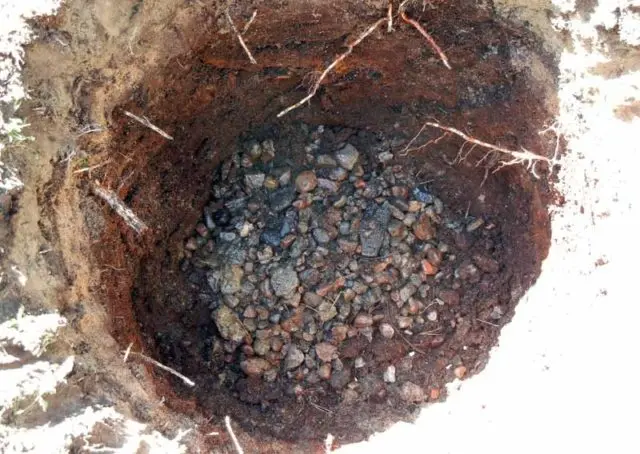
Then an earth mound is poured in the center of the pit. A seedling is placed on it. If the root system is open, the roots of the seedling are straightened along the walls of the earthen mound, and then sprinkled with soil to half. After that, add a bucket of water to the pit and finally fill it up. The soil is slightly compacted, an earthen collar is poured around the seedling to prevent water from spreading during irrigation. After that, the root zone is mulched with peat or humus.
How to transplant spirea to a new place
A spirea that has not reached the age of 4 can be safely transplanted to another place in the fall. The easiest way to do this is to dig it up with a clod of earth on the roots, and then plant it in another place. The root system of older bushes is already quite well developed, so transplanting an adult spirea in the fall will be fraught with certain difficulties. In this case, often not the entire bush is transplanted, but only part of it.
How to care for spirea in the fall
These perennial shrubs are quite unpretentious. Spirea care in the fall is simple and is not even considered mandatory by many. Some gardeners refer to these flowers in accordance with the “plant and forget” principle. However, small events are still desirable. In addition to pruning, caring for spirea in the fall includes watering, fertilizing, as well as loosening and mulching the soil. All of them have a greater effect on the decorative component.
How to water
In most cases, atmospheric moisture is quite enough for the growth and flowering of spirea. If there is a shortage of water, it is recommended to irrigate 2-3 times a month at the rate of 20 liters of water per bush. To avoid increased evaporation of moisture, the root zone is mulched.
How to feed spirea in the fall
Spirea is usually fed twice a year, before flowering and after pruning. This is a period of active growth, when the plant needs a maximum of nutrients. In autumn, as a top dressing for spirea, you can use both organic matter, for example, mullein infusion, and mineral fertilizers. Most often, flower growers use superphosphate for this purpose.
Protection against diseases and pests
With proper care, spirea practically do not get sick. An exception can only be neglected bushes, on which fungal diseases develop in wet weather. Of the insect pests on the spirea, aphids and spider mites most often appear. If pests are detected at an early stage and their colony is small, it is sometimes possible to wash them off with an increased pressure of water from a hose.
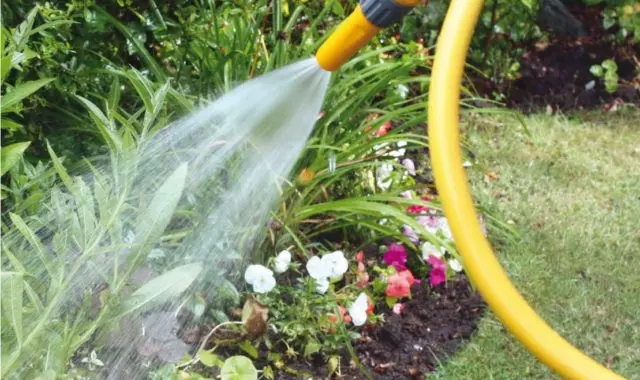
With increased activity of insects, chemical agents or an infusion of herbs are used: wormwood, celandine, chamomile. However, it should be noted that insect pests are not found on spirea in large numbers, therefore, even if they are present, the decorative effect of the bushes does not suffer.
How to prepare spirea for winter
The winter hardiness of this plant is sufficient to calmly endure frosts down to -50 ° C. Frost resistance can be weakened by excessive watering in the pre-winter period, too late pruning, due to which the plant does not have time to recover, as well as fertilizing spirea in autumn with nitrogen mixtures that stimulate the growth of shoots, thereby depleting the vitality of the bush. If you do not make these mistakes, preparing spirea for wintering is quite simple.
Do I need to cover the spirea for the winter
In regions characterized by a large thickness of snow cover, no additional shelter for spirea for the winter is required. If the thickness of the snow cover is insufficient, the bushes are covered with a layer of mulch, as well as sawdust, fallen leaves, straw, tops and other plant debris.
Preparing spirea for winter in the Moscow region
In the Moscow region and throughout the central part of Our Country, a fairly large amount of snow falls in winter. In these regions, in the pre-winter period, spirea bushes are tied into a bundle and laid on the ground. Additionally, plants are covered from above with a layer of fallen leaves, and then with snow. Such protection is quite enough for the plants to overwinter painlessly.
Preparing spirea for winter in the Urals
The climate of the Urals is more severe than that of the Moscow region. Preparation of spirea for winter is done in exactly the same way, however, it is more expedient to increase the heat-insulating layer. If in the Moscow region the thickness of the mulch layer of 10 cm is guaranteed to protect spirea bushes from freezing, then in the Urals it is necessary to double it at least.
How to propagate spirea in autumn
Spirea, like many other perennial shrubs, can be propagated in the following ways:
- seeds;
- cuttings;
- layering;
- division of the bush.
How to propagate spirea cuttings in autumn
Spirea in the fall is quite easy to propagate by cuttings. Planting material for spring-flowering varieties is harvested from the beginning of summer, and for summer-flowering varieties – from the middle. However, it is best to propagate spirea with lignified cuttings in early autumn. To do this, he uses annual shoots, cutting them in such a way that there are at least 5 buds on each segment. To reduce the loss of moisture during evaporation, the bottom leaf of the cutting is removed, and the top is cut in half.
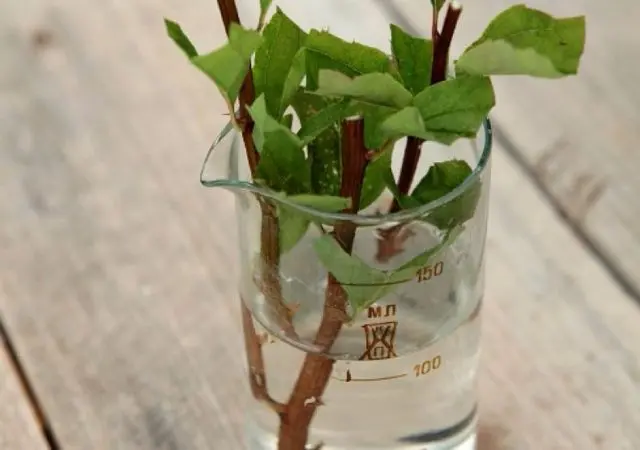
It is not necessary to use a root growth stimulator, even without it, the survival rate of cuttings reaches 70%. If the sections are processed, for example, with Kornevin, this figure will increase to almost 100%.
It is very important to ensure constant hydration. Therefore, the cuttings are placed in moist soil, and then covered with a film on top, creating greenhouse conditions. The easiest way is to use half a plastic bottle. In this state, the cuttings remain for the winter. It is only necessary to additionally cover the bottles on top with a layer of sawdust, dry grass or fallen leaves. In the spring, the shelter is removed, and the rooted cuttings are transplanted to a permanent place.
How to propagate spirea by dividing the bush.
Reproduction of spirea in the fall is also possible by dividing the bush. As a donor, you can use a plant older than 4 years. At this time, its root system is quite developed. The mother plant is completely dug out of the ground, its root system is cleaned with water from a hose. To cut the bush into separate sections, it is best to use a pruner.
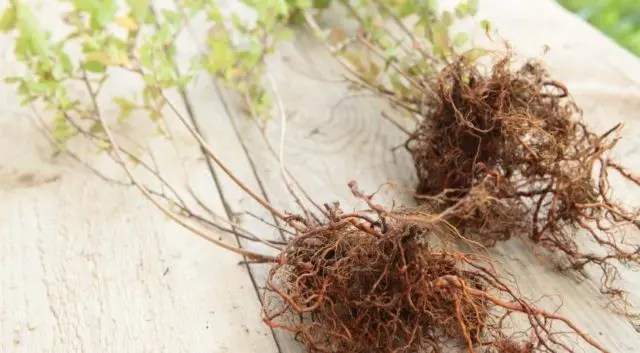
Each separated part should have several independent shoots with a full-fledged root system. Delenki are planted in prepared planting pits in the same way as usually seedlings.
Conclusion
Pruning spirea in autumn allows you to fully reveal the beauty of this ornamental shrub. The procedure is not difficult and time-consuming, so do not neglect it. Spirea tolerates pruning well, and concerns about the appropriateness of its implementation are completely in vain.









